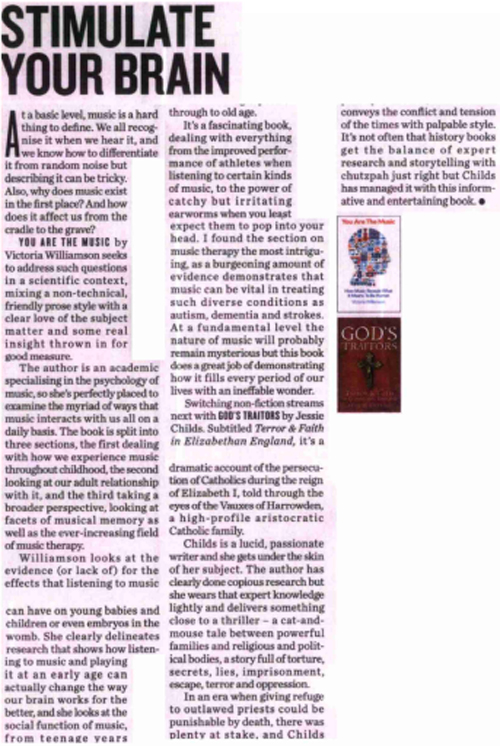News
-

Three articles from Joff Sharpe
19 Mar 2014
Business guru Joff Sharpe is also clearly a master of productivity, with three fascinating new articles this week, to promote his new book Who Dares Wins in Business.
Huffington Post: Avoiding the End of History
Education Post: Lead, follow or get out of the way!
British Land: If you want engaged employees send them to Antarctica
-

-

The Insider Guide to Agents
17 Mar 2014
Andrew Lownie, the best-selling literary agent in the world according to Publishers Marketplace, and recently short-listed for The Bookseller UK literary agent of the year, explains how the agency goes about selling its authors.
-

Paul Anthony Jones on Huffington Post
17 Mar 2014
Paul Anthony Jones has written a new blog for the Huffington Post, promoting his fascinating book Haggard Hawks and Paltry Poltroons: The Origins of English in Ten Words.
-

Great reviews for Cathy Glass's About Writing and How To Publish.
17 Mar 2014
Congratulations to Cathy Glass whose new book About Writing and How To Publish. - a departure from her fostering memoirs - have garnered terrific reviews:
“Clear, concise and packed full of practical tips..” iTunes
“About Writing is an invaluable guide for all aspiring writers…” The Book People.
“Cathy guides you through the entire process, from composing your first paragraph to seeing your book in print.” Lovereading.com
“… a guide to creative writing that both published and non-published writers/authors alike will find useful.” AntonySimpson.com
“This book will prove to be a valuable aid to any would be author. Cathy’s advice is really spot on, clear, concise and full of practical tips.” C Temlett. Amazon Reviewer
“Cathy Glass provides a clear and concise, practical guide on writing and the best ways to get published,” Fishpond.co.uk
“… I think it could teach some published writers a thing or two.” Robert. Amazon reviewer.
“… very insightful, structured and coherent. I like the short snappy chapters, that enable you to easily skim back and forth. There is plenty of useful advice, without being exhaustive. There are also helpful examples towards the end of the book.” A White. Amazon reviewer
-

Huge coverage for Monica Porter
17 Mar 2014
Monica Porter’s sensational memoir Raven: My year of dating dangerously… was released this weekend by Thistle Publishing, generating headlines worldwide, from the UK to Taiwan, Turkey and Malaysia. The book has shot into the Amazon Top 500.
-

Philippa Gregory reviews Desmond Seward
17 Mar 2014
Desmond Seward’s latest, The Demon’s Brood: A Plantagenet History from Anjou to Bosworth, has received a glowing review in The Times by celebrated historical novelist Philippa Gregory.
‘This is a big ballsy history of the sort that is seldom written in these nuanced days, and Seward reminds us of a style that has been all-but lost in this thundering account of the Plantagenet family — from 999 when Count Fulk burnt his young wife in her wedding dress, through 500 years to the man he calls the “suicide king”, Richard III… Best of all, and typical of this vivid opinionated history, is the postscript at the end of every reign when the author — who has not minced his words in the previous chapter — gives a magisterial summing up of the progress so far…. The general reader will find this book invaluable for filling in gaps of knowledge and putting a vivid story to a previously unknown monarch… It is a dramatic and page-turning history taking in the loss of the Norman inheritance, and then the shifting ownership of the “English” lands in France during the Hundred Years’ War. Seward’s description of the battle of Agincourt is particularly vivid … this is the medieval world — populated with heroes and seductresses, gods and murderers —and few know it better than Desmond Seward.’ Philippa Gregory
-

FT review for God's Traitors
17 Mar 2014
‘A superb account of cloak-and-dagger religious intrigue in Tudor England. God’s Traitors describes a John le Carre-like world of political double-dealing and ‘spiery’…God’s Traitors, with its crisp prose and punctilious scholarship, brilliantly recreates a world of heroism and holiness in Tudor England…as a mainstream history it is little short of a triumph.’
-

Third serial for Monica Porter
16 Mar 2014
The Mail on Sunday has featured Monica Porter for a third week running, in the week that her sensational new memoir Raven: My year of dating dangerously… is released.
-

Agent of the Year nomination for Andrew Lownie
14 Mar 2014
For the second year running, Andrew Lownie has been shortlisted for Literary Agent of the Year at the Bookseller Industry Awards.


